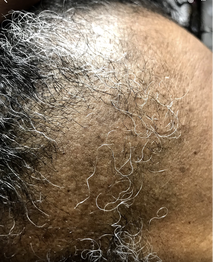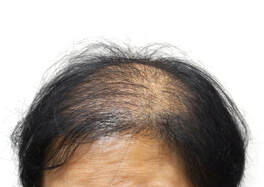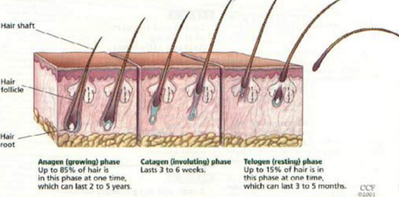|
You may or may not have heard of Trichology or a Trichologist, so I'll try to make it a little plain here.
Trichology is a science of the hair and the scalp. Trichology is the para-medical scientific study of the hair, hair loss and associated scalp problems. It encompasses the study of the diseases of the human hair and scalp, as well as the assessment of the cause(s) and cosmetic treatment of these disorders. The word “Trichology” comes from the Greek word, ‘Trikhos’, meaning ‘hair’ and ‘ology’ meaning ‘the study of’. Today, Trichology is perceived as a “bridge between cosmetology and dermatology.” Trichologists study Trichology and are trained in providing support and advice to people with hair and scalp-related conditions like hair breakage, oily scalp, alopecia and folliculitis. As they are experts in hair and scalp health, trichologists may also consult on how the client can keep their body in tip top condition. The Trichologists will thoroughly evaluate the client by collecting pertinent information such as medical history, diet, lifestyle, hair care routine among other things to attempt to make an accurate assessment of his or her condition. The Trichologist will also conduct a physical examination as well by assessing the hair and scalp by microscopically. In some cases, a hair analysis may be done to assess the health of the growing hair bulbs or to check for structural damage and presence of lice or fungal infection. It is also not unusual for a trichologist to request blood tests from your General Practitioner. After making an assessment, the trichologist is going to recommend the best treatment/therapy for the client’s condition. The treatment plan may consist of in-house treatments to help improve micro-circulation and regenerate cellular activity in the scalp as well as detoxing, exfoliation, certain shampoos and conditioners, topical serums, and recommendations about diet and/or lifestyle. If the Trichologist finds that the issues are brought about by an underlying medical condition, he/she will refer the client to a General Practitioner. NOTE: Trichologists work with clients on a holistic level. Trichologists are not medical doctors and do not give medical advice or prescribe medications. If you are experiencing problems with your hair and scalp, view our Trichologist Directory to find someone close to your area for assistance.
0 Comments
 Traction Alopecia is caused by the constant pulling and tugging on your hair due to extensions, braids, weaves, tight ponytails, consistent tight head dressings, etc. This type of alopecia is usually seen in women, but primarily African American women with the increase of the popularity of hair extensions and braids. The good thing about this type of hair loss is that it’s totally under your control. It’s up to you to have it or not. You can also definitely stop it from ever returning if you have had it. One main culprit is extensions and braid services. Overtime these services can weaken the hair, cause damage, dry it out and cause breakage to the hair making it appear thinner and eventually forcing the wearer to give up on hair extensions as a whole because of their hair loss. I’ve seen this happen too many times… Ladies are getting extensions and braids that are waay too tight and they continue this cycle of follicle abuse every month or two over a period of years until the point of no return. You’ve probably seen it too. The edges are thin or non-existent or the hair line has receded back, but they continue to get them because of convenience until they have to wear the extensions to cover up or end up having to start wearing wigs because now there’s no hair to braid to attach the extensions to. These are very sad cases and I’m praying that someone will receive this information and start to rehabilitate their hair and scalp… Ladies if you are feeling discomfort with the service you're receiving, that means it’s too tight. I also want to mention, we can also see this type of alopecia in children as well because of the consistent, tight ponytails and head bands being worn around the head. The only cure is to loosen up and/or stop what’s causing it as I mentioned earlier. Here are some traction alopecia symptoms: 1. Have you ever undone a ponytail and found your scalp feels sensitive to the touch afterwards? 2. Does untying your hair feel like a relief? 3. Does your scalp itch after you've had braids or a weave put in? 4. Have you ever taken painkillers because your hair is secured so tightly it's given you a headache? 5. Do you notice pustules (blisters filled with pus) or papules (little pimples) on your scalp? This is because of the irritation being caused to the scalp and is a clear indicator that the follicles just can't cope with the strain. All of these are warning signs that your hair is under way too much tension. Your body is trying to tell you something... and you need to listen! You may ask, ”Will my hair grow back?” If you spot the warning signs of traction alopecia early enough and you put a stop to whatever's causing it, then your hair will stop falling out and should - with time, patience and loving care - your hair and scalp can be completely restored to its former glory. But if the hair follicles have been so badly traumatized for such a long period of time that they have scarred, then the hair will not grow back by itself. Areas of the scalp where this is the case will likely look shiny. In cases like this, you'll need to think about another type of restoration or hair replacement.  August is National Hair Loss Awareness Month! It's important for us to spread the word and create awareness about this issue that affects so many year after year! This month highlights the impact that hair loss can have on our lives that many are too embarrassed or afraid to talk about still. According to research, 35 million men and 21 million are suffering with hair loss in the U.S. alone, with over 810,000 of them getting professional treatment. The average number of hair follicles on the scalp is 110,000 and it’s very natural for a person to lose 50 to 100 hairs a day during the body’s renewal process. If you see bald patches or experience excessive thinning, you are suffering from hair loss, commonly referred to as alopecia. For those that suffer with signs of hair loss, there can be numerous underlying causes; like genetics, medication, metabolic problems, styling practices, chemotherapy, exposure to radiation and other harmful chemicals. You can also experience hair loss from a fungal infection, trauma from injury or damage from compulsive pulling and that’s not to mention nutritional deficiencies and hormonal factors like thyroid disease, skin disease or even stress. They say that by the age of 35, most men and women would have experienced some form of hair loss, and with so many being affected by this issue, the American Academy of Dermatology decided to officially declare August as National Hair Loss Awareness Month. By observing this month, those who suffer from hair loss-related issues can be educated about their condition and empowered to reach out for help to discover the potential causes and treatments which exist for them. And most importantly, it shows them that they are not alone in this. |
AuthorKendra Timmons is the Founder and Executive Director of the Institute of Trichology Studies. ArchivesCategories |
|
Become an Certified Trichologist Practitioner and Hair Loss Expert! The Institute of Trichology Studies provides educational courses and personal mentorship that will nurture each student into a knowledgeable and marketable Expert Trichologist who will improve people’s holistic health leading to positive hair and scalp health outcomes.
Our school is accredited through AADP - American Association of Drugless Practitioners. Institute of trichology studiesHOME OFFICE: The Hair Recovery Center Arlington, Tx 76015 817-317-6733 [email protected] www.InstituteOfTrichologyStudies.com FIND A TRICHOLOGIST or HAIR LOSS PROFESSIONAL www.HopeForHairLoss.com www.FindATrichologist.com |
© COPYRIGHT 2020. ALL RIGHTS RESERVED.

 RSS Feed
RSS Feed

